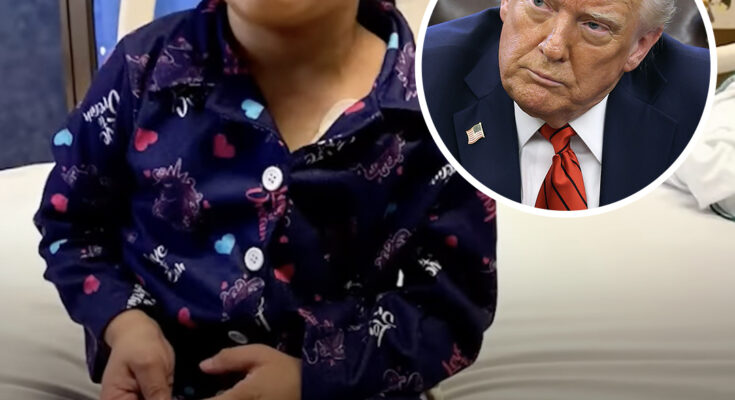Sofia, a pseudonym used to protect her privacy, has endured serious health challenges at a young age, and just as she’s found relief, it now risks being taken away.
At just four years old, Sofia Vargas, the daughter of Deysi Vargas and her husband, is facing the unimaginable: deportation from the United States, where she receives specialized treatment that keeps her alive.
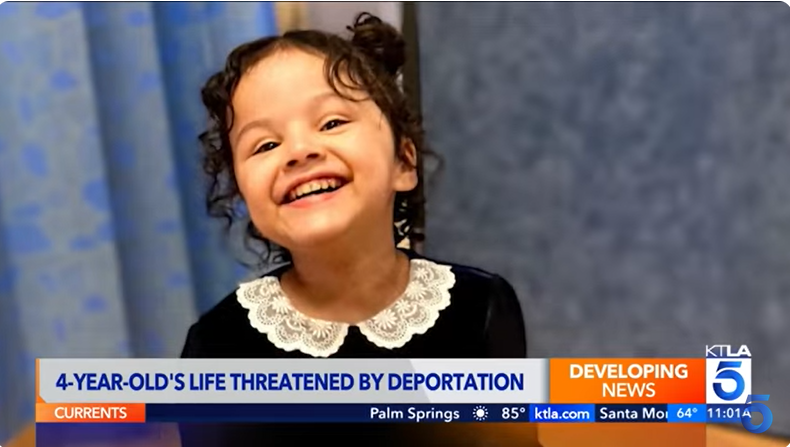
Sofia, from a post dated May 28, 2025 | Source: Youtube/5live
Born prematurely in Mexico, Sofia has battled short bowel syndrome, a rare and life-threatening condition that prevents her body from absorbing nutrients. For most of her life, she’s relied on a complex system of intravenous and gastric feeding, with her survival dependent on access to specialized medical care.
Her condition demands a high level of precision and infrastructure — the kind that’s only available through U.S.-based programs. Any interruption in her daily nutrition system, called Total Parenteral Nutrition (TPN), could be fatal within days, according to Dr. John Arsenault of the Children’s Hospital Los Angeles.
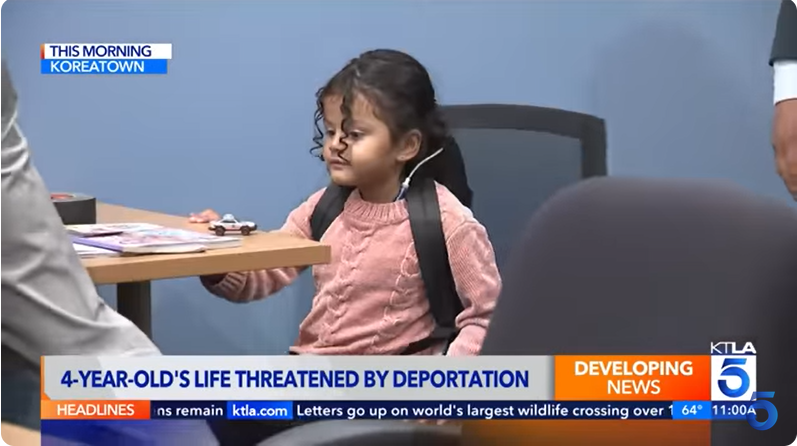
Sofia, from a post dated May 28, 2025 | Source: Youtube/5live
“As such, patients on home TPN are not allowed to leave the country because the infrastructure to provide TPN or provide immediate intervention if there is a problem with IV access depends on our program’s utilization of U.S.-based healthcare resources and does not transfer across borders,” noted Arsenault, who sees Sofia every six weeks.
That reality is now clashing with immigration policy. Last month, the girl’s family, who had been granted temporary humanitarian entry into the U.S. via Tijuana in July 2023, received a notice that their legal status had been terminated.
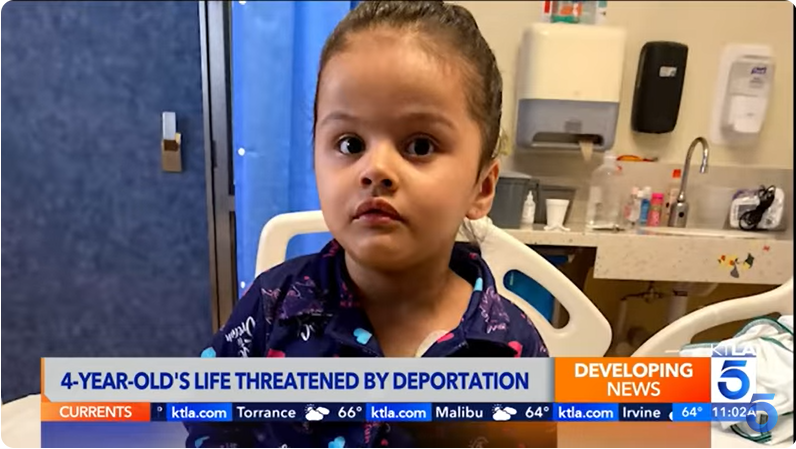
Sofia, from a post dated May 28, 2025 | Source: Youtube/5live
The letter advised them to voluntarily leave the country to avoid deportation, a move that could immediately endanger the child’s life.
The girl’s attorney, Rebecca Brown of the pro bono firm Public Counsel, said the consequences of such an order are dire. “This is a textbook example of medical need. This child will die and there’s no sense for that to happen. It would just be a cruel sacrifice,” she shared.
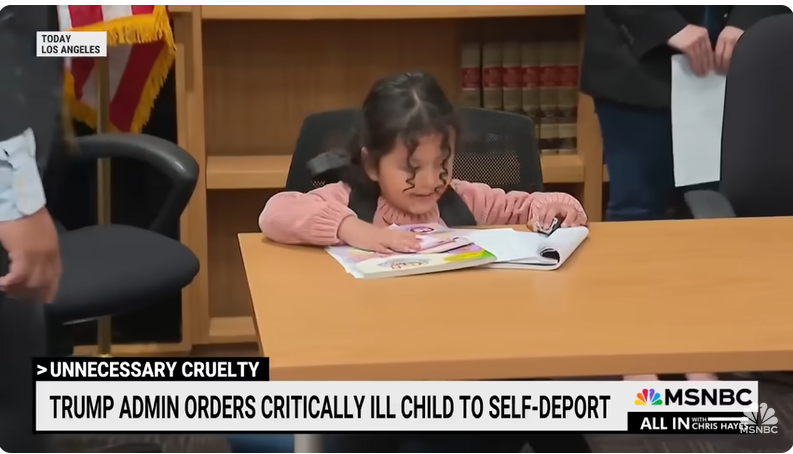
Sofia, from a post dated May 29, 2025 | Source: Youtube/@msnbc
Sofia was born in Playa del Carmen after her parents, 28-year-old Vargas from the Mexican state of Oaxaca and her 34-year-old husband from Colombia, moved there for work. The couple met in Cancun where they were working before moving to Playa del Carmen so that Sofia’s dad could work as an Uber driver.
At Playa del Carmen, Sofia was born prematurely and was immediately placed in intensive care. After identifying her condition, doctors performed six surgeries to remove an intestinal blockage.
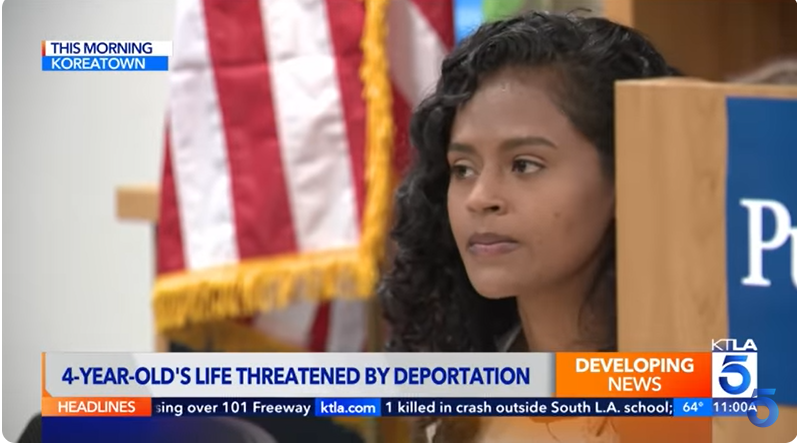
Deysi Vargas, from a post dated May 28, 2025 | Source: Youtube/5live
However, Vargas said that too much of her intestine was taken out, leaving the child with short bowel syndrome. She suffered multiple bloodstream infections, one of which nearly proved fatal.
Her weight varied dramatically. Some months, she appeared severely underweight, with thin limbs and a distended stomach that seemed at odds with her family’s access to basic resources. At other times, her cheeks were full, resembling those of any healthy infant.
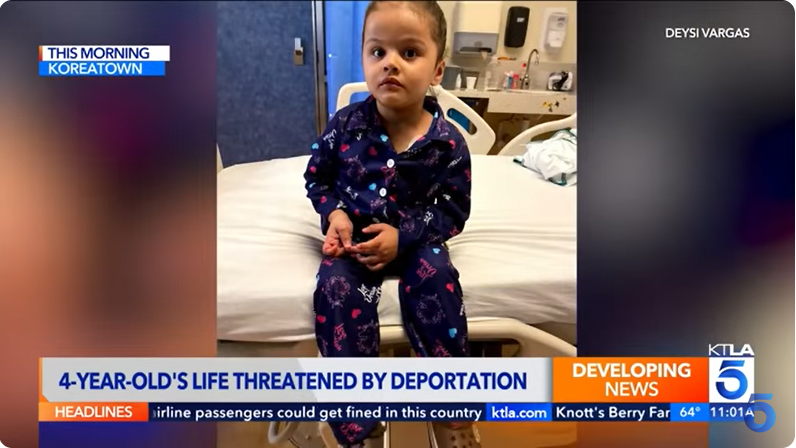
Sofia, from a post dated May 28, 2025 | Source: Youtube/5live
When she reached 7 months old, a physician advised the family to move to Mexico City, which offered the country’s most advanced pediatric care for her condition. While her health initially showed signs of progress, the infections kept recurring.
Unable to hold a job, Vargas spent every day at the hospital with her daughter. She recalled frequent issues: medication errors, nurses overlooking her daughter’s needs, and finding her in soiled clothing because no one had cleaned her overnight.
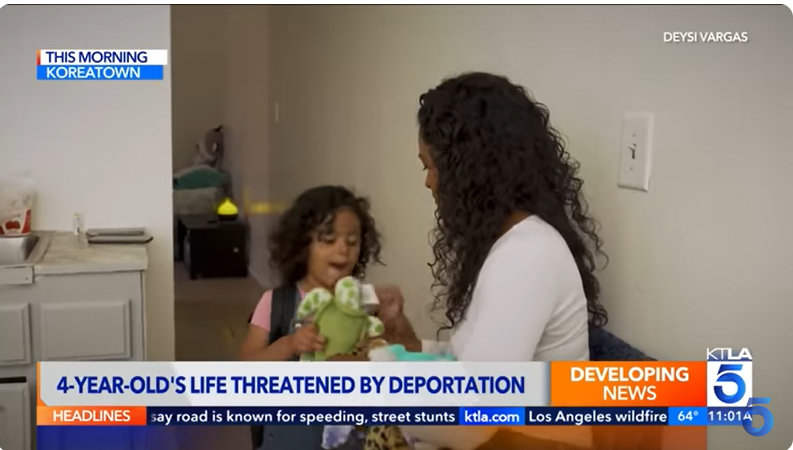
Sofia and Deysi Vargas, from a post dated May 28, 2025 | Source: Youtube/5live
Despite Vargas’s vigilance, she said a nurse once accidentally accelerated the feeding system, causing the girl to rapidly urinate the fluids out. She became dehydrated and her blood sugar spiked, prompting another stay in intensive care until her condition stabilized.
Vargas had read stories about children with similar diagnoses going on to lead healthy lives in other parts of the world. In Mexico, though, her daughter’s condition remained unchanged by the time she turned two. When Vargas learned of the CBP One app, which allowed migrants to book appointments with US border officials, she registered for one.
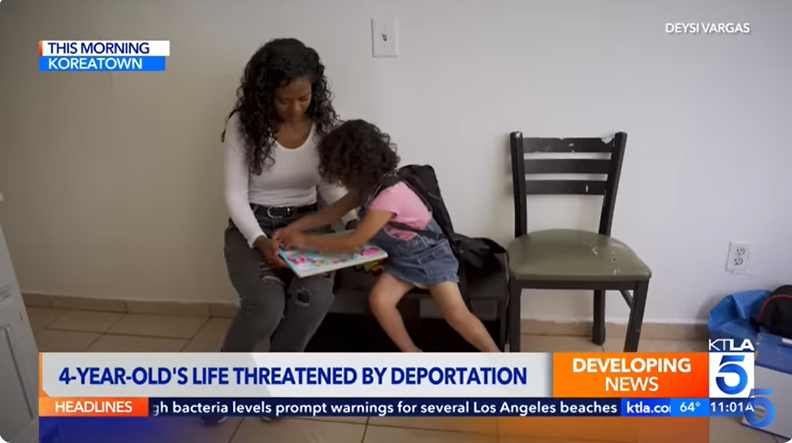
Sofia and Deysi Vargas, from a post dated May 28, 2025 | Source: Youtube/5live
The program granted those accepted a two-year reprieve from deportation along with work authorization. Ahead of their scheduled appointment on July 31, 2023, the family traveled to Tijuana. Vargas carefully removed her daughter from the hospital, still connected to intravenous nutrition bags.
At the border, her husband disclosed that cartel members had once kidnapped and extorted him. Border agents also noticed the child’s fragile condition. Later that day, the family was transferred to Rady Children’s Hospital in San Diego. There, the girl’s condition quickly improved.
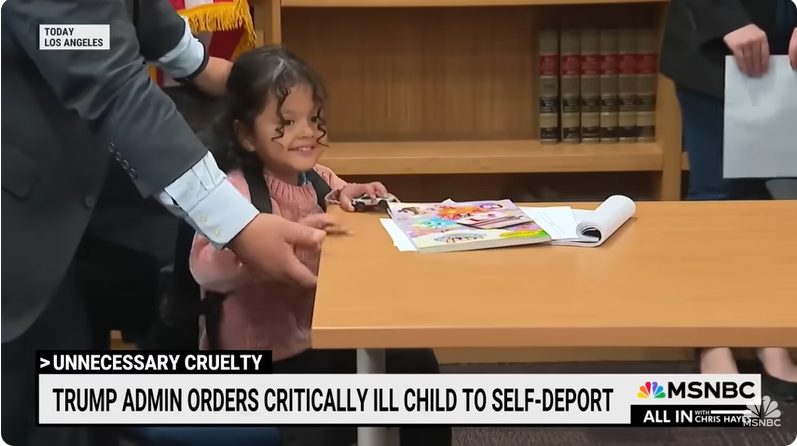
Sofia, from a post dated May 29, 2025 | Source: Youtube/@msnbc
While she had previously relied on 24-hour intravenous feeding, doctors gradually reduced her dependence as her digestive system strengthened. A year later, she was referred to Children’s Hospital Los Angeles, home to one of the country’s leading pediatric gastroenterology departments.
Both parents took up informal jobs, and by September 2024, they had relocated to Bakersfield. Their daughter was finally discharged. For the first time, she was able to explore the world beyond hospital walls, something that made her parents happy.
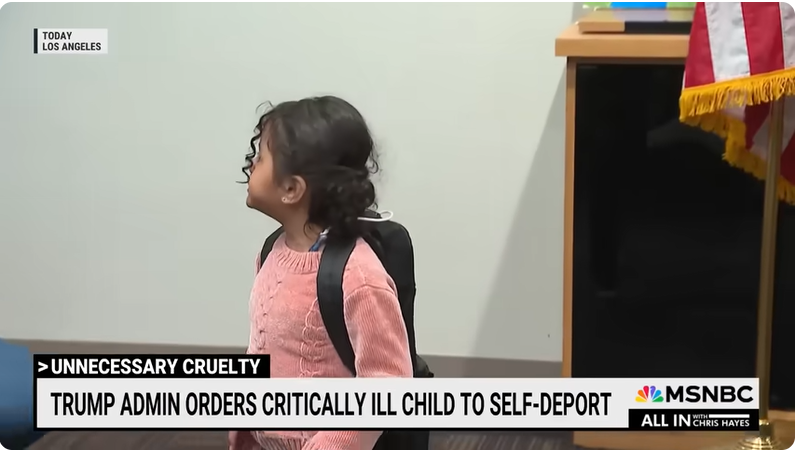
Sofia, from a post dated May 29, 2025 | Source: Youtube/@msnbc
At a Walmart, her eyes widened in wonder as her mother pushed the cart through the aisles. Now, she still requires 14 hours of overnight IV feeding and carries a backpack to support the system when outside.
Still, for four times daily, Vargas administers a different type of nutrition that flows directly into her daughter’s stomach via a gastric tube, each session lasting about an hour. At preschool, the girl carries a larger backpack filled with a milky fluid, and the school nurse handles her midday feeding.
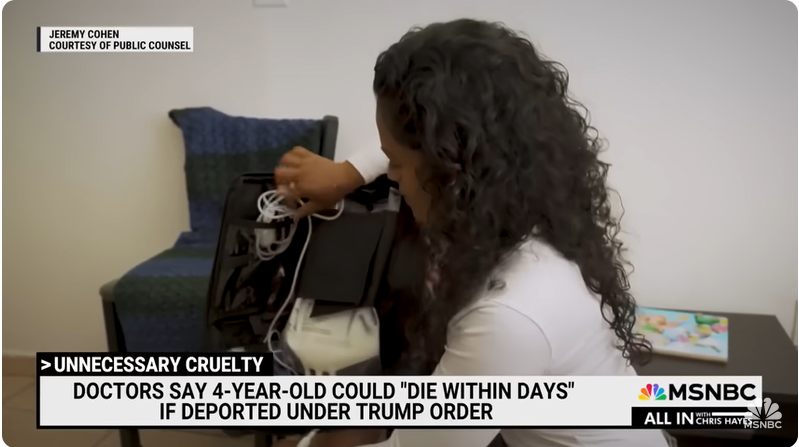
Deysi Vargas handling Sofia’s backpack, from a post dated May 29, 2025 | Source: Youtube/@msnbc
Before bath time, Vargas disconnects her daughter’s IV lines, rinses them with saline, and secures a plastic sheet over her chest to prevent water from reaching the site and causing infection.
One recent morning, Vargas dressed her in pink leggings, a Hello Kitty T-shirt, and black Puma sneakers. As they walked to preschool, hand in hand, her damp curls bouncing and the oversized backpack swinging behind her knees, the moment offered Vargas a sense of normalcy and hope.
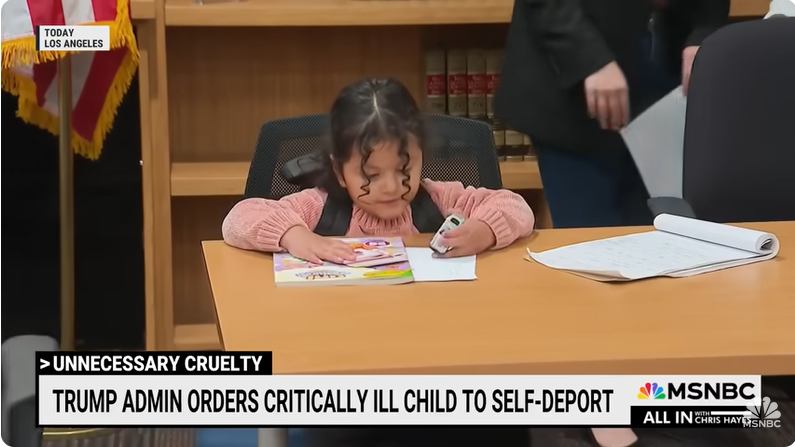
Sofia, from a post dated May 29, 2025 | Source: Youtube/@msnbc
Her medical expenses are covered by Medi-Cal, but daily life in the U.S. remains financially challenging. Their small living space holds only the essentials: a hot plate on a folding table, a mini-fridge stocked with nutrition packs, a single chair, and an IV stand. Without a full kitchen, Vargas often prepares simple meals like sandwiches or soups.
She recently began working regularly as a restaurant cleaner, and for a moment, things felt more stable. But in April, she received a notice from immigration officials via a series of emails. This month, she learned that her work authorization had been revoked.
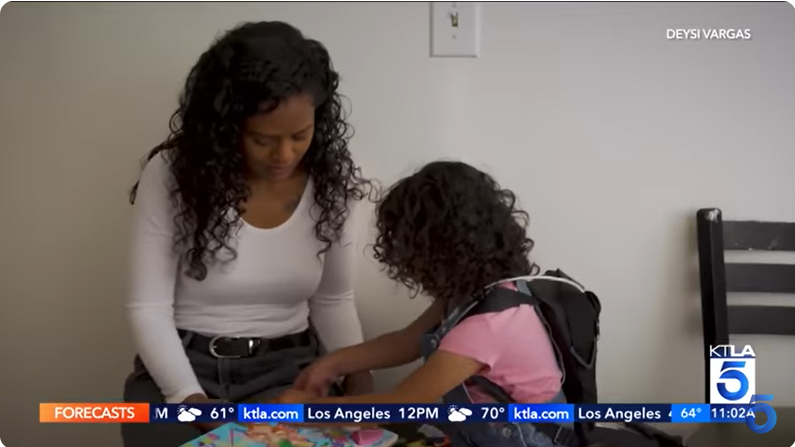
Deysi Vargas and Sofia, from a post dated May 29, 2025 | Source: Youtube/@msnbc
With her husband out of work due to an injury, Vargas said they sometimes only eat once a day after covering rent, utilities, diapers, and other basics. She fears that losing her job could push them into homelessness.
The idea of returning to Mexico, where her daughter’s condition once went untreated, is frightening. Vargas believes the treatment available there is still insufficient. She said they would have remained in Mexico if not for the severity of her daughter’s illness.
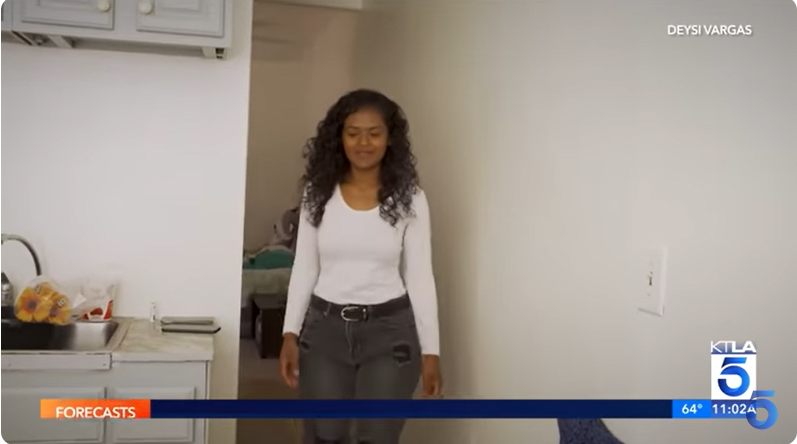
Deysi Vargas, from a post dated May 29, 2025 | Source: Youtube/@msnbc
Their plan is to stay only as long as treatment is necessary, though how long that might be is uncertain. They remain hopeful she will eventually no longer need supplemental feeding.
Brown, submitted a request to reinstate their temporary humanitarian protection, citing the girl’s ongoing medical needs. She believes the family’s legal status was rescinded in error. “This is the intended purpose — to help the most vulnerable who need attention here. We can avoid having harmed the child and the family,” she noted.
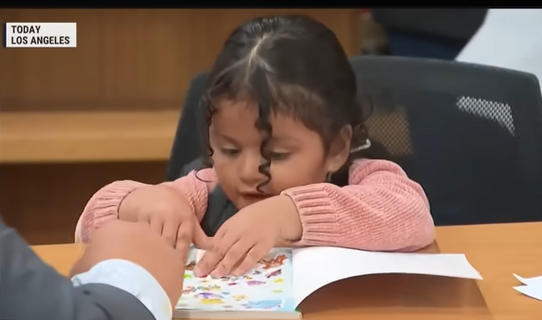
Sofia, from a post dated May 29, 2025 | Source: Youtube/@msnbc
Gina Amato, one of a group of attorneys working for the family without pay, also said, “They were not given any reason as to why. There’s no allegations that they have violated the rules or anything like that. They were supposed to have parole through the end of July.”
Amato emphasized that doctors had made it clear the child’s life depended on uninterrupted treatment, stating that without it, she would die within days. For that reason, the family needs to stay in the US.
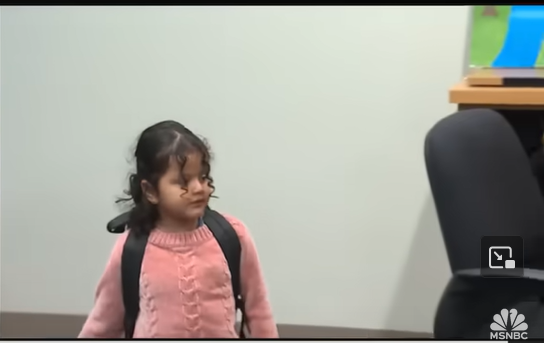
Sofia, from a post dated May 29, 2025 | Source: Youtube/@msnbc
On his first day in office, President Donald Trump signed an executive order aimed at limiting the use of humanitarian parole. He directed that it be applied strictly on a case-by-case basis and only in situations involving urgent humanitarian needs or a clear public benefit.
Despite campaign claims that enforcement would target those with criminal records, many immigrants without any such history—including those like Vargas who entered using CBP One—have since received notices to leave voluntarily or face potential prosecution.
“These are being sent out indiscriminately across the country, but to see it sent to a family whose 4-year-old child depends on this lifesaving treatment is really shocking,” Amato declared.
The app Vargas originally used to gain entry is now called CBP Home, which guides users through the process of self-deportation. According to the notice, failing to comply may result in the federal government locating them.
Now, Vargas has launched a GoFundMe campaign, explaining that the unexpected shift in their situation has threatened Sofia’s ongoing treatment at Children’s Hospital Los Angeles.
She wrote that any support would help them stay focused on Sofia’s care during a difficult and uncertain time. By the time of publication, the fundraiser had gathered $25,595 of its $30,000 goal.
Meanwhile, the family’s lawyers are working to have the government reverse its decision, reinstate their humanitarian parole, and extend it beyond the original July 2025 expiration date. They are seeking to get the attention of immigration authorities while also exploring legal options through the courts.
